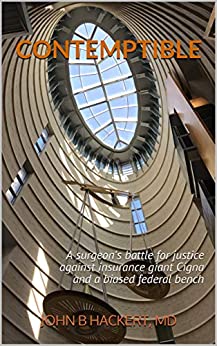
CONTEMPTIBLE: A surgeon’s battle for justice against insurance giant Cigna and a biased federal bench received a 4+ star review, making it an IndieReader Approved title.
Following find an interview with author John Hackert.
What is the name of the book and when was it published?
“CONTEMPTIBLE: A surgeon’s battle for justice against insurance giant Cigna and a biased federal bench”
Published September 19, 2019
What’s the book’s first line?
“It’s really the makings of another story but circumstances spoke and I ended up closing my practice as a colorectal surgeon and transitioned to assisting-only. If you’re wondering why anyone would choose that ‘all guts, no glory’ field, outside of Hollywood none of medicine is particularly glamorous and the grueling years of general surgery residency tend to steer the apprentice toward a subspecialty matching the temperament.”
What’s the book about? Give us the “pitch”.
This book is a condemnation of the ever-consolidating medical insurance industry’s Cigna, and an at-minimum partial judicial system, the stakes of which reach well beyond the author’s plight into the lives and health of many otherwise unaware.
What inspired you to write the book? A particular person? An event?
To explain the impetus for this book I should mention that I’ve had the privilege of studying Latin and a construct of which is the so-called gerundive, something which ought—more toward must—be done. The English word “agenda” is the gerundive of Latin’s agere, “to do” – things to be done. Similarly, I would not have been at peace if I hadn’t put the story to the page.
What’s the main reason someone should really read this book?
Have you noticed in your own life’s path that aphorisms only seem to ring with ever greater clarity? Arguably the most fundamental of all is “health, wealth, and happiness,” and in that order, because without the first the others lose import. I would submit that the medical establishment is on the verge of collapse, without strength of which the patient—inevitably all of us—will suffer. A parasite if sentient would realize that if it saps its host to point of death, it too will die…unless of course it could just move on to the next tap. But are we not safeguarded by the judiciary? The book contains many legal citations which, though perhaps dry to lay readers, are accessible, and critical to the understanding of what happened in this story – at crux, a brazen contravention of even Supreme Court precedent. If you subscribe to “knowledge is power,” I expect you will find this book worthy of your time.
